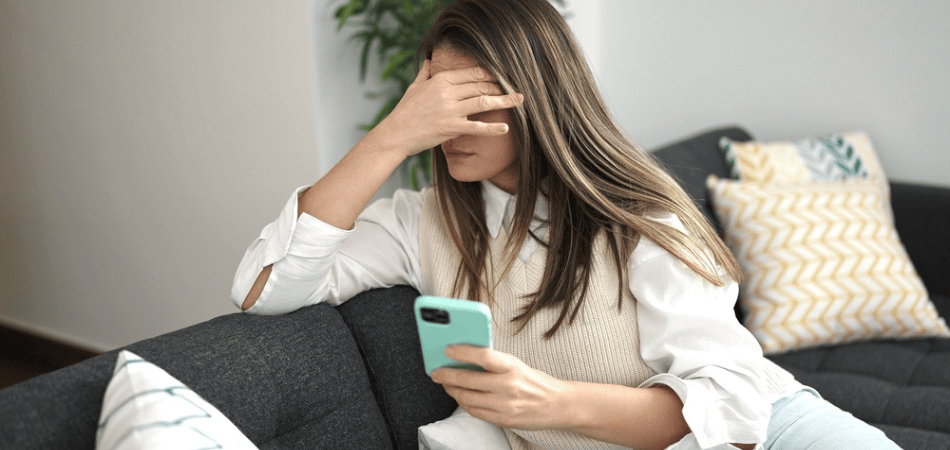Last Updated:
April 3rd, 2025

Today, there are 5.16 billion internet users worldwide. This means that around 68% of the world’s population spends time online in some capacity. Spending time online can lead to education, outreach, and positive social exposure. Engaging with social media, in particular, can result in feelings of ‘digital inclusion’ that researchers have suggested can have palpable ‘economic, cultural, social and personal’ benefits.
With that being said, we do frequently hear warnings about the risks associated with the internet: the dangers of being too present online, of potential isolation, and even of online harassment and dependency. But is there such a thing as ‘too much’ time online? What level of internet use can be considered as an ‘online addiction?’ Are there ways to take a step back from the digital world in the twenty-first century? What may this look like in a world surrounded by screens?
Social media: A double-edged sword?
With the development of early social media sites such as Bebo, MySpace, and Friendster, social media has been a part of our lives in some capacity for a number of decades. However, the explosion of apps such as Snapchat, Instagram and TikTok has revolutionised our use of the internet. Perhaps more than that, they have also revolutionised the ways that we use our time.
Around 60% of the global population are users of social media. This equates to 4.76 billion people on various social media platforms across the world. In 2024, the average daily use is 143 minutes, meaning social media users spend approximately 2 and a half hours surfing social media each day.
Social media can be hugely positive for many, providing:
- Instant communication
- A sense of connection
- Finding new friends
- Building confidence
- Broadening understanding of the world
- Deepening digital media literacy
- Offering a place to seek support
- Offering a place to ‘campaign for social good’
However, without moderation, social media use can become unhealthy, leading to:
- Social anxiety
- Depression
- Social withdrawal
- Body and self-image concerns
- Replacement of in-person socialising
- Cyberbullying / online harassment
- Behavioural addiction
Social media is not wholly negative – when used safely and appropriately, it can be a mode of engaging with the world in a balanced way. However, a lot of this balance comes down to our screentime.
Screen time and mental health
‘Screentime’ is the amount of time we spend with screens. Recent research suggests that we spend around 7 hours with our screens each day. With around 44% of our waking hours spent looking at screens,
The study indicates that:
- we spent an average of 3 hours 46 minutes on our smartphones in 2023
- we spent an average 2 hours 51 minutes with our desktop computer screens in 2023
The recommended daily screen time for adults is less than 2 hours daily. This suggests that we are spending between 3 and 4 times more time with our screens than is suggested.
Screens are everywhere – but spending too much time on them can cause serious harm to our bodies and minds, resulting in:
- difficulty sleeping
- reduced emotional wellbeing
- a thinning in the cortex (the outer layer of the brain)
- reduced focus
- feelings of guilt
- aches, pains and poor posture
- reduced engagement with physical activity
- eyestrain and sight issues from blue light exposure
Risk of cyberbullying and online harassment
The National Bullying Helpline reports that over 5,000 people in the UK visit their website daily. Cyberbullying is often addressed in schools across the country. However, this type of bullying can happen to children, teenagers and adults alike.
It can take the form of:
- trolling
- mobbing
- stalking
- grooming
- hacking and blackmail
- identity theft or fraud
- posting images or videos without consent
In the context of online harassment, the internet has the capacity to become a very dark place.
The signs of internet addiction
Alongside the negative effects of increased screen time and the risk of cyberbullying, harassment and associated crime, the internet also houses another risk: the potential of addiction. Many people may laugh at the idea of an internet or social media addiction. However, Internet Addiction Disorder (IAD) can cause a range of ‘neurological complications, psychological disturbances, and social problems.’
Internet use is frequent and common – but when it becomes compulsive or pathological, then there may be a need for an intervention. Signs of internet addiction include:
- preoccupation with the internet
- needing to use the internet for longer periods of time to feel satisfied
- failed attempts to cut down on or stop internet use
- feeling restless, depressed or irritable when not online
- staying online for longer than planned
- experiencing social, interpersonal, professional or academic losses due to internet use
- concealing the extent of internet use
- using the internet to cope with negative emotions
Digital detox: Being more mindful of your time online
One of the best ways to protect both your physical and mental health in the digital world is by being more mindful of your time online. You can do this by creating a digital detox involving:
- planning time away from screens throughout the day
- taking breaks from screens
- replacing your smartphone with a less app-supportive device
- turning off your notifications
- turning off your phone
- have rooms in the house without screens (such as the bedroom)
Getting support
The internet can offer support for individuals struggling. Engagement with social telehealth and online therapy options can be life-changing for people struggling to source help in person. However, if you feel your internet use is spiralling, you may benefit from speaking to someone outside of cyberspace. You can contact an addiction specialist at UKAT to find out more about the signs, symptoms and available treatments for internet and social media addiction.





